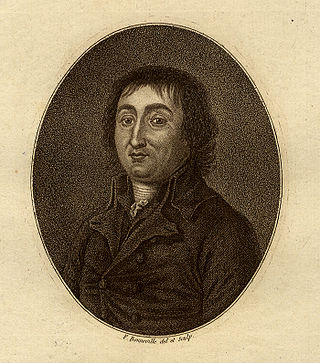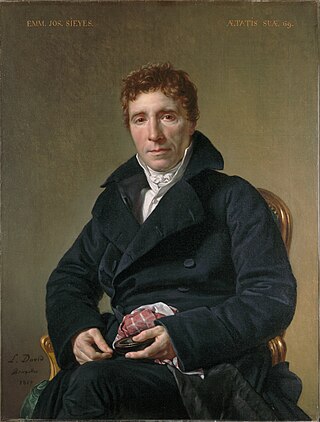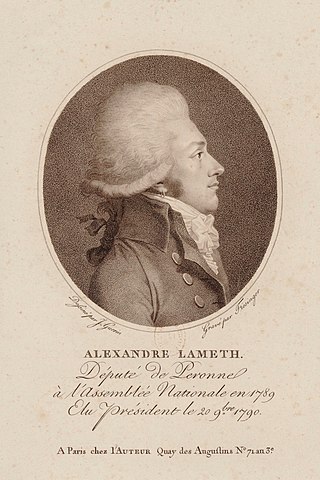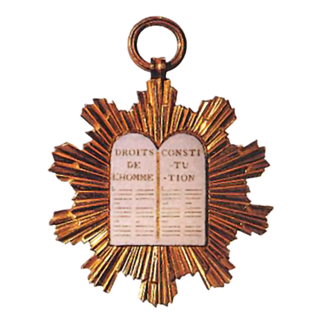Related Research Articles

The French Revolution was a period of radical political and societal change in France that began with the Estates General of 1789 and ended with the formation of the French Consulate in November 1799. Many of its ideas are considered fundamental principles of liberal democracy, while the values and institutions it created remain central to French political discourse.

Pierre-Joseph Cambon was a French statesman. He is perhaps best known for speaking up against Maximilien Robespierre at the National Convention, sparking the end of Robespierre's reign.

The National Constituent Assembly was a constituent assembly in the Kingdom of France formed from the National Assembly on 9 July 1789 during the first stages of the French Revolution. It dissolved on 30 September 1791 and was succeeded by the Legislative Assembly.

Emmanuel-Joseph Sieyès, usually known as the Abbé Sieyès, was a French Roman Catholic abbé, clergyman, and political writer who was the chief political theorist of the French Revolution (1789–1799); he also held offices in the governments of the French Consulate (1799–1804) and the First French Empire (1804–1815). His pamphlet What Is the Third Estate? (1789) became the political manifesto of the Revolution, which facilitated transforming the Estates-General into the National Assembly, in June 1789. He was offered and refused an office in the French Directory (1795–1799). After becoming a director in 1799, Sieyès was among the instigators of the Coup of 18 Brumaire, which installed Napoleon Bonaparte to power. Moreover, apart from his political life, Sieyès coined the term "sociologie", and contributed to the nascent social sciences.

A constituent assembly is a body assembled for the purpose of drafting or revising a constitution. Members of a constituent assembly may be elected by popular vote, drawn by sortition, appointed, or some combination of these methods. Assemblies are typically considered distinct from a regular legislature, although members of the legislature may compose a significant number or all of its members. As the fundamental document constituting a state, a constitution cannot normally be modified or amended by the state's normal legislative procedures in some jurisdictions; instead a constitutional convention or a constituent assembly, the rules for which are normally laid down in the constitution, must be set up. A constituent assembly is usually set up for its specific purpose, which it carries out in a relatively short time, after which the assembly is dissolved. A constituent assembly is a form of representative democracy.

Alexandre-Théodore-Victor, comte de Lameth was a French soldier and politician.

The French Revolution was a period in the history of France covering the years 1789 to 1799, in which republicans overthrew the Bourbon monarchy and the Roman Catholic Church in France perforce underwent radical restructuring. This article covers the one-year period from 1 October 1791 to September 1792, during which France was governed by the Legislative Assembly, operating under the French Constitution of 1791, between the periods of the National Constituent Assembly and of the National Convention.
This is a glossary of the French Revolution. It generally does not explicate names of individual people or their political associations; those can be found in List of people associated with the French Revolution.

The Legislative Assembly was the legislature of the Kingdom of France from 1 October 1791 to 20 September 1792 during the years of the French Revolution. It provided the focus of political debate and revolutionary law-making between the periods of the National Constituent Assembly and of the National Convention.

The French Constitution of 1791 was the first written constitution in France, created after the collapse of the absolute monarchy of the Ancien Régime. One of the basic precepts of the French Revolution was adopting constitutionality and establishing popular sovereignty.

During the French Revolution, the National Assembly, which existed from 17 June 1789 to 29 September 1791, was a revolutionary assembly of the Kingdom of France formed by the representatives of the Third Estate (commoners) of the Estates-General. Thereafter, it was known as the National Constituent Assembly, although the shorter form was favored.
The dechristianization of France during the French Revolution is a conventional description of the results of a number of separate policies conducted by various governments of France between the start of the French Revolution in 1789 and the Concordat of 1801, forming the basis of the later and less radical laïcité policies. The aim of the campaign between 1790 and 1794 ranged from the appropriation by the government of the great landed estates and the large amounts of money held by the Gallican Church to the termination of Christian religious practice and of the religion itself. There has been much scholarly debate over whether the movement was popularly motivated.

An Assembly of Notables was a group of high-ranking nobles, ecclesiastics, and state functionaries convened by the King of France on extraordinary occasions to consult on matters of state. Assemblymen were prominent men, usually of the aristocracy, and included royal princes, peers, archbishops, high-ranking judges, and, in some cases, major town officials. The king would issue one or more reforming edicts after hearing their advice.

The National Assembly is the bicameral legislature of the Republic of Haiti, consisting of the upper house as the Senate (Sénat) and the lower house as the Chamber of Deputies. Both assemblies conduct legislative sessions at the Haitian capital of Port-au-Prince. Since January 2023, every seat in each house is vacant as elections have been repeatedly delayed and the final elected legislators' terms expired on January 10.

The Society of the Friends of the Constitution, better known as Feuillants Club, was a political grouping that emerged during the French Revolution. It came into existence on 16 July 1791. The assembly split between the Feuillants on the right, who sought to preserve the position of the king and supported the proposed plan of the National Constituent Assembly for a constitutional monarchy; and the radical Jacobins on the left, who wished to press for a continuation of the overthrow of Louis XVI. It represented the last and most vigorous attempt of the moderate constitutional monarchists to steer the course of the revolution away from the radical Jacobins.
Legislative elections were held in France September 1791 to elect the Legislative Assembly, the first national election for the legislature. Suffrage was limited to men paying taxes were allowed to vote, although less than 25% of those eligible to do so voted.

The Kingdom of France was a constitutional monarchy that governed France from 3 September 1791 until 21 September 1792, when this constitutional monarchy was succeeded by the First Republic.
Events from the year 1791 in France.

Louis-Charles-César Maupassant, born 25 April 1750 in Saumur, died 11 March 1793 in Machecoul, was a merchant, farmer and deputy to the French National Convention.
References
- Frey, Linda; Frey, Marsha (2004), The French Revolution (illustrated, annotated ed.), Greenwood Publishing Group, p. 98, ISBN 9780313321931